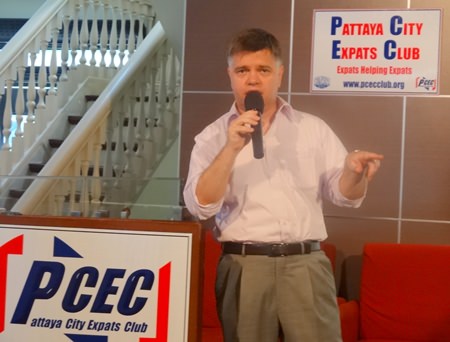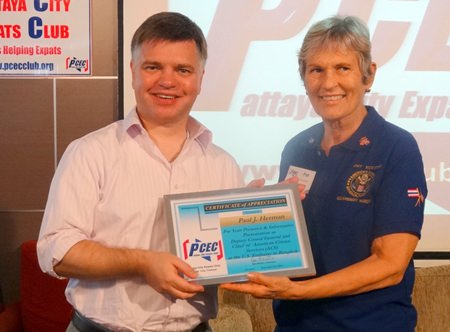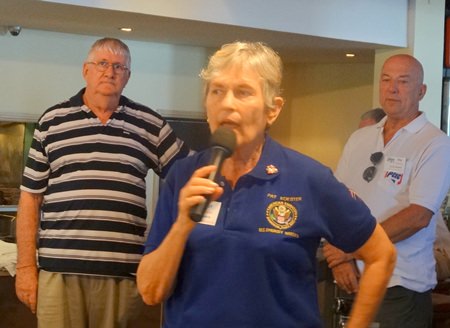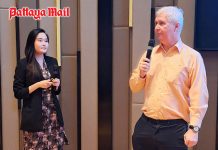At the U.S. Embassy in Bangkok, life is never boring. Officials report that just about every day they encounter a new situation. Paul J. Herman, Chief of the American Citizens Services unit (ACS), made this comment to the Pattaya City Expats Club on Sunday, November 23. The ACS is one of three units in the embassy’s consular section. Paul said that Bangkok ACS is one of the most active of the ACS units in U.S. embassies around the world. He has a staff of about 20, half U.S. citizens and half Thai. Paul said he was very proud of the contribution of his Thai staff.
ACS deals with documentation services and specific citizen services, such as assisting Americans who have been injured, arrested, etc.
For Americans coming to Thailand, ACS provides a range of services. It produces a regularly updated consular information sheet, available at http://travel. state.gov/content/travel/english.html which includes information on visa and entry requirements, safety and security issues, health issues, etc. ACS also provides the latest information on security issues, scams and political events such as street demonstrations via their website http://bangkok.usembassy.gov.
 Paul J. Herman, Chief of the American Citizens Services (ACS) unit of the US Embassy in Bangkok describes the wide range of services they provide to assist American citizens in Thailand.
Paul J. Herman, Chief of the American Citizens Services (ACS) unit of the US Embassy in Bangkok describes the wide range of services they provide to assist American citizens in Thailand.
Americans can register with the embassy’s Smart Traveler Enrolment Program, available at either of the above websites and receive routine, security or emergency messages from the embassy.
The Thai government estimates that there are some 60,000 Americans in Thailand on long-term visas (retirement, student, work, etc.). In 2012, there were 811,000 entries of person from the U.S. into Thailand.
 Board member Pat Koester, who is also a US Embassy Warden for Pattaya, presents the PCEC’s certificate of appreciation for Paul Herman’s informative talk about the US Embassy’s American Citizens Services unit.
Board member Pat Koester, who is also a US Embassy Warden for Pattaya, presents the PCEC’s certificate of appreciation for Paul Herman’s informative talk about the US Embassy’s American Citizens Services unit.
Paul said that the embassy deals with 5,000 passport applications a year in the Bangkok office, and another 1,000 in the Chiang Mai office. Passports are normally issued within 10-14 days. The embassy also handles about 700 reports of birth each year.
In 2013 there were about 300 deaths of U.S. citizens in Thailand, most from natural causes but also some from accidents or foul play. When there is a death, Paul explained, the role of ACS is to oversee the security of the estate and inform the next of kin. ACS also produces the “Consular Report of Death Abroad” of a U.S. citizen, an administrative document that provides essential facts about the death, disposition of remains, and custody of the personal estate of the deceased U.S. citizen and which can generally be used in legal proceedings in the U.S. as proof of death.
Contacting the next of kin is not always simple, especially when there are multiple families involved. Americans would be well advised to get a will that explains everything they want to have happen when they die (including funeral arrangements).
There are currently about 30 U.S. citizens in Thai jails. Paul said that ACS staff visit them regularly and do what they can to assist, which basically means ensuring that they are treated fairly. The unit has a list of attorneys that it can provide, but being on the list does not constitute a recommendation. If we hear of someone who has just been arrested, Paul said, we may ask one of our volunteer wardens to check it out, especially if the arrest takes place far from Bangkok.
Wardens are volunteers who assist consular sections in disaster preparedness by alerting U.S. citizens to emergency situations and passing on information. Wardens also provide ACS with key information, both about specific individuals and for situational awareness, from the local community or area. There are currently about 100 wardens spread throughout Thailand.
 Pat Koester advises PCEC members and guests about upcoming events.
Pat Koester advises PCEC members and guests about upcoming events.
Paul explained that many of the arrests are for visa overstay. There are a lot of deportations every year, the cost of which must be borne by the individuals. ACS may be able to help facilitate payment from family or friends. Thai police are obliged to notify the U.S. Embassy when an American is arrested, but some police in the provinces may not be aware of this requirement.
In 2013, Paul said, the ACS processed over 11,000 notarials, most of which involved income statements. There are about 100 appointments a day at the ACS offices, of which 70-80% are for notarial services. The fees for these services are set by the State Department in Washington.
Regarding visas to the U.S., Paul said that the U.S. Embassy gets about 60,000 visa applications a year; and the approval rate is about 90%. Paul said that the ACS deals with a number of issues, most of which fall into the category of “welfare or whereabouts” – i.e. Americans who are in difficulty or in hospital or are simply missing.
ACS sometimes deals with Americans who are quite elderly. They may be suffering from dementia or other mental health issues. Many of them need care but cannot afford it. Some of them have no one to go back to in the U.S. This is a very difficult part of our work, Paul said. ACS also assists Americans who have been victims of crimes, including families of the few U.S. citizens who have been murdered in Thailand.
Paul stressed that much of the work ACS does is bound by the U.S. privacy act, which means that the embassy cannot share information with anyone without the person’s consent. This sometimes creates misunderstandings when dealing with family members.
Paul said that the ACS unit is in frequent contact with other embassies, particularly the ones from English-speaking countries. This contact is very valuable when “new” issues emerge, such as when foreigners start coming to Thailand for surrogacy reasons, a fairly recent phenomenon. Paul mentioned that ACS does outreach visits to several cities in Thailand. It comes to Pattaya four times a year (visit http://bangkok.usembassy.gov/consular_outreach.html for schedule).
After the presentation, MC Richard Silverberg updated everyone on Club activities and upcoming events and then called on Roy Albiston to conduct the Open Forum where questions are asked and answered about Expat living in Thailand, especially Pattaya.
For more information on the PCEC’s many activities, visit their website at www.pcecclub.org.




